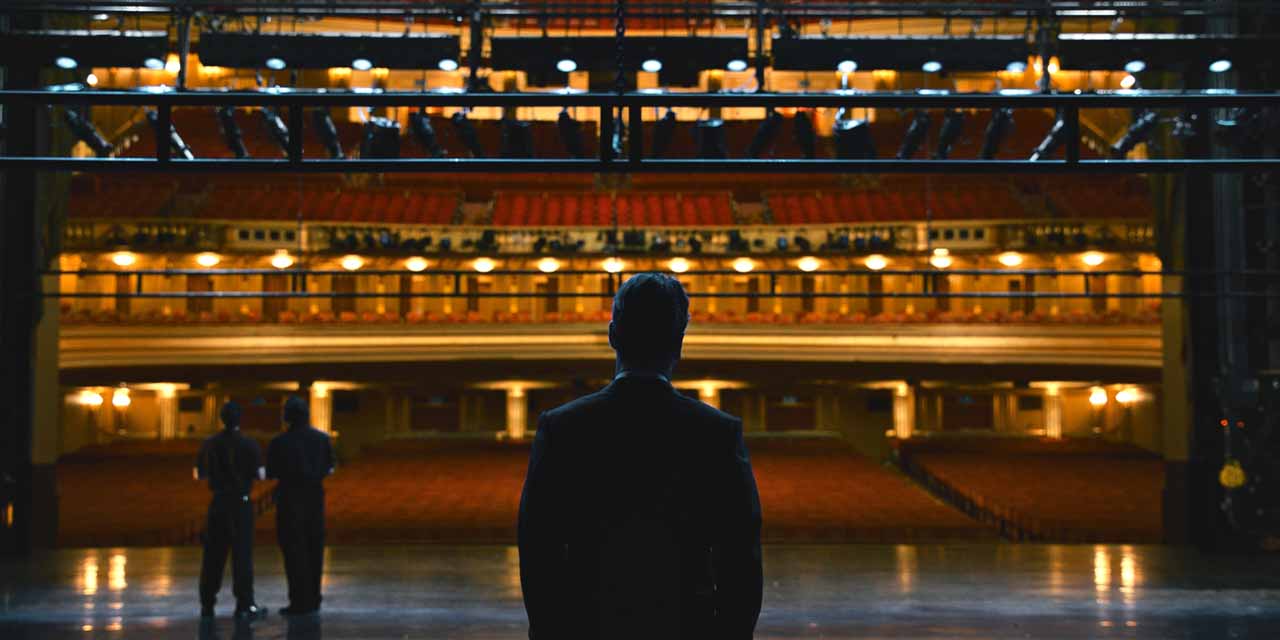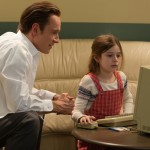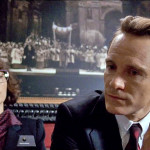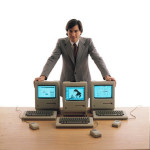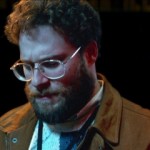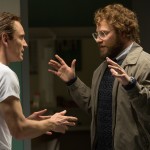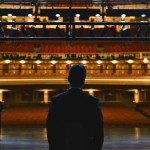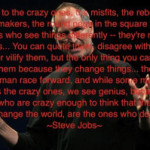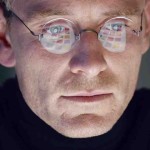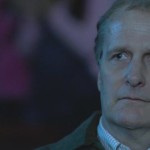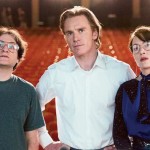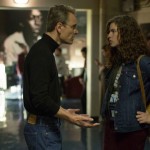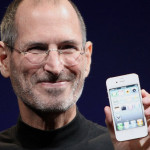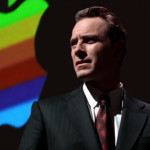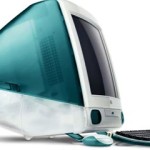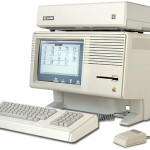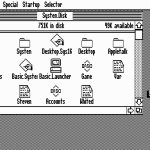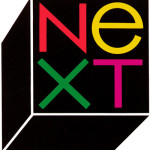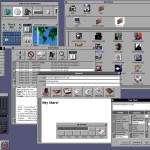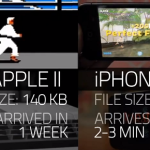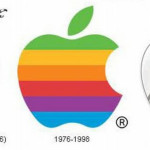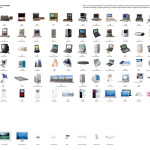“It’s not binary. You can be decent and gifted at the same time” – Steve Wozniak in Steve Jobs movie
There’s no doubt I was very rapidly sold on Apple gear from the moment I started working on the good old-fashioned Macintosh in the late 1980s as a young consultant working with KPMG in Manchester. Compared to the green-screen PCs with endless menus and short-cuts, it was truly a revelation to find a workable Graphical User Interface (GUI) – and behind every massive leap in technological usability there lies somewhere a man with a vision.
Danny Boyle‘s Steve Jobs is less a conventional biopic of the genius behind the Macintosh and many more massive steps forwards in the application of popular computing, but much more a terse and wordy tragedy in three Acts; or a soap opera, take your pick. There are times as you watch this movie that you might forget that Jobs was not only a legend but a hugely successful and wealthy legend in his own right. After all, Apple isn’t doing so badly, four years after his death!
At its best SJ the movie is like Richard III written for the digital age, given that the hero comes across more as an anti-hero; but at worst it is an endless tirade of verbal wrangling as the same characters chew the fat over the same issues prior to three consecutive product launches, which seem terrifyingly close to complete catastrophe:
Andy Hertzfeld: It’s a system error.
Steve Jobs: [annoyed] Fix it!
Andy Hertzfeld: [incredulous] Fix it?
Steve Jobs: Yeah!
Andy Hertzfeld: We’re not a pit crew at Daytona. This can’t be fixed in seconds.
Steve Jobs: You didn’t have seconds. You had three weeks. The universe was created in a third of that time.
Andy Hertzfeld: Well, someday, you’ll have to tell us how you did it.
But how close to reality is Steve Jobs the movie? Barely at all, so some critics would tell you (see here, here, here and here.) Time’s analysis of the principle protagonists can be found here, the portrayal of some certainly venturing towards caricature. Perhaps what it seeks to do is to justify Bud Tribble‘s famous term to describe the charisma of Jobs: Reality Distortion Field (RDF). Trust me, there is plenty of reality distortion going on here.
Like King Richard he is portrayed by literature as a monster – a massively charismatic but troubled man lurching from one crisis to the next and back again. He is a man who talks in technicalities almost as a punctuation of speech but who in reality cares far more about brand and style than substance. He is frequently wrong but justifies his decisions by saying he can see the big picture:
Steve Wozniak: What do you do? You’re not an engineer. You’re not a designer. You can’t put a hammer to a nail. I built the circuit board! The graphical interface was stolen! So how come ten times in a day I read Steve Jobs is a genius? What do you do?
Steve Jobs: Musicians play their instruments. I play the orchestra.
For instance, he cares far more about the NeXT cube being an exact cube than he does about how it performs, or the people who make it perform. His role as a visionary genius, an innovator (in the sense of one who exploits an invention, not the inventor) is mentioned but seldom can you put a finger on how he delivers that genius.
What we do know from this portrait is that he was a control freak and perfectionist who expects people to achieve miracles but totally lacking in human warmth and empathy – sky-high intelligence but with minimal emotional intelligence. The only acknowledgement of any internal weakness comes in the one line: “I’m poorly made.”
Does he care about those close to him? Apparently not: “I don’t want people to hate me. I’m indifferent if people hate me.” He is also immune to love, by his daughter, even by devoted confidant Joanna Hoffman, of whom more anon.
The seam running through the three episodes portrayed in this melodrama is that Jobs was incapable of managing a relationship with his own progeny – his daughter Lisa (also more to follow.) Most of us would say to him, “get a life” – though the truth may be very different.
However, many scenes are invented and Aaron Sorkin‘s wordy script skews out of all proportion the idiosyncrasies of Jobs, say those who knew him well. Perhaps many of the decent quotes get drowned out in the sea of words, but for a man who spent his life creating pithy epigrams, Jobs has but a few in this script (Jobs on leadership quotes to be found here.) I certainly don’t believe the real SJ spoke the way Sorkin portrays him, but then does anyone speak the way a biopic has them articulate? They certainly don’t talk in an endless stream of soundbites and speeches worthy of the bard!
Clearly this is not a movie that could be made while Jobs was alive, for fear of being buried in law suits, which prompts a slightly different question. Boyle could have made a fictionalised version of Jobs, where accuracy would not be measured directly but in which he could artfully create a parallel and metaphorical representation of the character as a big bad wolf? As it is, this is definitely a work leaning towards the revisionist school of posthumous screen fiction.
But then this is Danny Boyle we’re talking about, a man who never does anything by half measures. So what were Sorkin and Boyle trying to create?
“(they) say their movie seeks to portray a character who fundamentally changed the nature of modern communication, but whose interpersonal relationships were deeply dysfunctional.”
The case for the defence is phrased thus by Boyle:
“It was what Shakespeare used to do. He would take some of the facts about a man of power and he would guess at a lot of the rest and just gotten away at actually getting at the human in it. And that’s what’s wonderful about the writing I think, is that it acknowledges the people who disliked [Steve Jobs], the people he hurt. But in the end, he brings it back to a very simple father-daughter relationship that he has to admit that he has made some of the most beautiful things in the world.”
In that goal they succeed admirably, albeit at a cost. This Jobs is deeply dysfunctional – his means of communication consists of talking at a considerable rate of knots while picking fights with people who care about him and frustrating the hell out of them by denying them space for their ideas and desires.
Disregarding this aspect for a moment, Boyle’s modus operandi is remarkable. He has approached it like a theatrical production, rehearsed each scene for several weeks before shooting it, so it does indeed come out in a Shakespearean manner. Maybe he is not the first to employ this method of coaching his actors, but I wish more directors would do so, since it enables gifted actors to shine.
There is not a bad performance to be seen, but of even greater significance is that a few have escaped from the shadow of their own reputation, none more so than Seth Rogen, erstwhile bumbling and slightly porky comic actor who seems liberated in a straight role of Steve “Woz” Wozniak, designer and engineer of Apple 1 and Apple 2 computers. Truth be told, the script does not do Woz too many favours, suggesting he is in a time warp and wants only acknowledgement for the role he and his fellow engineers played in the initial designs and building the computers that created the foundations of the empire that is now a household name.
Of the leading players, there can be no doubt Michael Fassbender and Kate Winslet are truly versatile and gifted performers, both capable of conveying subtle emotions and unpeeling their characters like the proverbial onion. I don’t believe Fassbender is Jobs, but he is most certainly a compelling and formidable, if not iconic figure worthy of the great innovator – though the performance would suggest Jobs learns lessons from the past very slowly.
By contrast, Winslet’s Hoffman matures into a true ally, one who begins with a sense of awe but ends not only admitting her own emotional frailties (she claims to have loved Jobs in silence all along) but not afraid to challenge her mentor. She is Horatio to Jobs’s Hamlet – unswerving in her devotion. Perhaps that is an apt analogy, given that some have compared Jobs to the Dane, teetering on the brink of madness and doom.
But if Hoffman is Horatio, then the CEO Jobs hired from Pepsi-Cola, John Sculley (Jeff Daniels), is almost like the Ghost of Christmas past, one who continues to appear like an apparition to haunt Jobs, weighed down by his sacking of Jobs from the company Jobs founded, and later by his own sacking.
Jobs, on the other hand, returned triumphant from another failure in the form of NeXT (whose launch is the second Act of the film (after being bought out by Apple for the UNIX-based NeXTSEP operating system that laid the foundations of OSX, used to this very day on Apple computers. His next contribution was the initial iMac, the launch of which forms final vignette from this Jobs trilogy.
But the touchstone and, in a sense, the nemesis of Jobs the man, is Lisa, the daughter whose paternity he initially denied, whom he grudgingly supported, whose tuition fees were paid by Hertzfeld because the humiliated Jobs neglected to pay. Hell, this the man who even denied f0r many years the Apple Lisa was named after his little girl – how obtuse does a man have to get? “Coincidence” my arse!
Lisa is no fool, and certainly inherited from her father qualities of stubbornness and determination. Their relationship was clearly difficult, much as it was with Lisa’s mother Chrisann Brennan, but did resolve itself to mutual satisfaction by virtue of Lisa standing up to her old man and not allowing him to drag her down. Ultimately, that is all that Jobs respects – or so we are led to believe.
Sadly, the unsentimental boundaries within which Boyle conducts 99% of the movie are broken right at the death with an unnecessarily tacky and schmalz-laden ending, which stinks of studio exec interference. Not quite a tear-inducing reunion, but just a smile and Jobs holding the picture Lisa drew on MacPaint as a 5-year old.
Whatever. Steve Jobs is less a voyage around the great man and more an attempt to cram a life into three episodes. Like Richard III it creates a distorted view of reality, and is therefore subject to being burned by the same Reality Distortion Field. But imagine for a moment that this was a fictional subject, not a real man: that works brilliantly! Yes, I like this work of fiction about a tragic hero who was blind to his own shortcomings.
PS. The view of a friend who has seen the film and read this review:
Really enjoyed reading the review, loved the comments about tragedy, Shakespeare, Sorkin script, fiction and reality and quite agreed about Seth Rogan. Interesting to me that you ended it so positively. I suppose I wonder about the tragedy label? He turned out to be an amazing success and seemed to repair something with his daughter. Not much of a tragic hero unless being a bit sadistic,nasty and dying young counts… almost more a fairy tale, almost redemptive, but actually so much form over content, almost an endictment of one aspect of 21 st century life.

